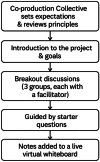Public Involvement in Complex Theorising: A Co-Produced Logic Model of the Role of Context in Shaping Child Health
- PMID: 40755183
- PMCID: PMC12319229
- DOI: 10.1111/hex.70346
Public Involvement in Complex Theorising: A Co-Produced Logic Model of the Role of Context in Shaping Child Health
Abstract
Introduction: There is increasing work towards drawing on theory, implementing co-production and accounting for complexity within the production of systematic reviews for public health. In this paper, we report on the process of co-producing a theory; in this case, a graphical articulation of theory in the form of a logic model, which describes how contextual factors influence children's health.
Methods: We undertook a series of three online co-production workshops, involving 18-20 participants in each, and worked with an advisory group of experts with professional and lived expertise. An online virtual whiteboard was used to support the identification of factors that contributed to poorer childhood health, explanations for these factors, and connections between different factors.
Results: Driven by government strategy, we initially focussed our work on childhood obesity. However, co-production was transformational in switching the focus of the logic model away from a narrow focus on Body Mass Index as a measure of obesity, to a more holistic theory of factors that shape children's health, recognised as the intersection between healthy eating, physical activity and mental well-being. Theorising with a diverse range of co-producers helped us to recognise the stigmatising impacts that an exclusive focus on clinical measures of children's health can have, and the way that a narrow clinical focus inhibits theorising the complexity and drivers of poorer health.
Conclusion: Co-production led to a switch in theorising away from narratives of children's health that focus closely on personal responsibility, towards narratives that explore structural and contextual drivers of health.
Patient or public contribution: The logic model was entirely driven by the contributions of researchers, those with lived experience (e.g., as parents and/or who have experienced poor health), and those with professional experience (e.g., as teachers) who worked together to co-produce the model. An advisory group composed of people with a similar range of expertise helped to shape the conduct of co-production and dissemination (including in the preparation of this manuscript).
Keywords: children's health; complex systems; co‐production; logic model; weight management.
© 2025 The Author(s). Health Expectations published by John Wiley & Sons Ltd.
Conflict of interest statement
The authors declare no conflicts of interest.
Figures
References
-
- Noyes J., Hendry M., Lewin S., Glenton C., Booth A., and Garside R.. 2015. Guidance for Review Authors on Choice and Use of Social Theory in Complex Intervention Reviews. Version 10. Cochrane.
-
- Thomas J., Kneale D., Booth A., Garside R., and Noyes J., “Selecting and Using Theory,” in Cochrane‐Campbell Handbook for Qualitative Evidence Synthesis, ed. Noyes J. and Harden A. (Wiley, 2024).
-
- O'Mara‐Eves A., Laidlaw L., Candy B., Vigurs C., Collis A., and Kneale D.. The Value of Co‐Production Research Project: A Rapid Critical Review of the Evidence. 2022.
-
- Funnell S. C. and Rogers P. J., Purposeful Program Theory: Effective Use of Theories of Change and Logic Models (John Wiley & Sons, 2011).
-
- Rehfuess E. A., Booth A., Brereton L., et al., “Towards a Taxonomy of Logic Models in Systematic Reviews and Health Technology Assessments: A Priori, Staged, and Iterative Approaches,” Research Synthesis Methods 9, no. 1 (2018): 13–24. - PubMed
MeSH terms
LinkOut - more resources
Full Text Sources
Medical




